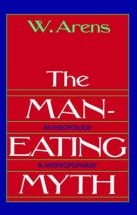 The first English-language edition of the book | |
| Author | W. Arens |
|---|---|
| Language | English |
| Subject | Cultural anthropology, cannibalism |
| Publisher | Oxford University Press |
Publication date | 1979 |
| Publication place | United States and United Kingdom |
| Media type | Print (Hardback and paperback) |
| Pages | 206 pp. |
| ISBN | 978-0-19-502793-8 |
The Man-Eating Myth: Anthropology and Anthropophagy is an influential anthropological study of socially sanctioned "cultural" cannibalism across the world, which casts a critical perspective on the existence of such practices. It was authored by the American anthropologist William Arens of Stony Brook University, New York, and first published by Oxford University Press in 1979.
Arens' primary hypothesis is that despite claims made by western explorers and anthropologists since the 15th century, there is no firm, substantiable evidence for the socially accepted practice of cannibalism anywhere in the world, at any time in history. Dismissing claims of cultural cannibalism made against the Carib and Aztec peoples by invading Spanish colonialists, he tackles 19th and 20th century claims regarding socially acceptable cannibalism in Sub-Saharan Africa and New Guinea. Turning to prehistory, he critiques archaeological claims to have discovered evidence for such practices in Europe and North America. In the second half of the work, Arens puts forward his argument that an erroneous belief in "others" who commit socially sanctioned cannibalism is a global phenomenon. He proceeds to chastise the anthropological community for perpetuating the "Man-Eating Myth", suggesting reasons as to why they have done so.
The Man-Eating Myth was widely reviewed in academic journals and also attracted attention from mainstream press. Views were mixed, with most reviewers highlighting the intentionally provocative nature of the work. Critics charged Arens with constructing straw man arguments and for exaggerating the methodological problems within anthropology. Though the book was influential and caused a critical re-evaluation of much prior work, its main hypothesis was largely rejected by the academic community.[1][2][3] Increasing archaeological evidence for cannibalism in the decades after the book's publication has made it even less plausible.
- ^ Lévi-Strauss 2016, p. 87.
- ^ Lindenbaum 2004, pp. 475–76, 491.
- ^ Scott & McMurry 2011, p. 216.
© MMXXIII Rich X Search. We shall prevail. All rights reserved. Rich X Search
